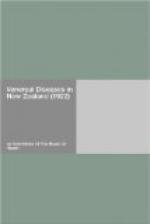The Committee are of opinion that the extent of accidental infection is greatly exaggerated in the public mind, but a few cases occasionally occur, and the Committee recommend that there should be better provision of public conveniences, especially for women, and the U-shaped closet-seat should be adopted. The use of common towels and drinking-cups in railway-trains, schools, factories, and elsewhere is condemned not only for the reasons stated above, but on general sanitary grounds.
SECTION 4.—PREVIOUS INQUIRIES AND CONFERENCES.
After the repeal of the Contagious Diseases Act in England in 1886, various Committees and Royal Commissions, such as the Inter-departmental Committee on Physical Deterioration in 1904, the Royal Commission on the Poor-laws in 1909, and the Royal Commission on Divorce in 1912, drew attention to the frightful havoc wrought by venereal disease, and urged that further action should be taken to deal with the evil. In 1913 the British Government appointed a Royal Commission to inquire into the prevalence of venereal diseases in the United Kingdom, their effects upon the health of the community, and the means by which these effects could be alleviated or prevented, it being understood that no return to the policy or provisions of the Contagious Diseases Acts was to be regarded as falling within the scope of the inquiry.
The Commission took a great deal of most valuable evidence, and did not present their final report until 1916. They recommended improved facilities for diagnosis and treatment, including free clinics. They came to the conclusion that at that time any system of compulsory personal notification would fail to secure the advantages claimed. The Commission added, however, “it is possible that the situation may be modified when these facilities for diagnosis and treatment [recommended by the Commission] have been in operation for some time, and the question of notification should then be further considered. It is also possible that when the general public become alive to the grave dangers arising from venereal disease, notification in some form will be demanded.” The Commission supported the adoption of a recommendation by the Royal Commission on Divorce to the effect that where one of the parties at the time of marriage is suffering from venereal disease in a communicable form and the fact is not disclosed by the party, the other party shall be entitled to obtain a decree annulling the marriage, provided that the suit is instituted within a year of the celebration of the marriage, and there has been no marital intercourse after the discovery of the infection. The Commission urged that more careful instruction should be provided in regard to moral conduct as bearing upon sexual relations throughout all types and grades of education. Such instruction, they urged, should be based upon moral principles and spiritual considerations, and should not be based only on the physical consequences of immoral conduct. They also favoured general propaganda work, and urged that the National Council for Combating Venereal Diseases should be recognized by Government as an authoritative body for the purpose of spreading knowledge and giving advice.




